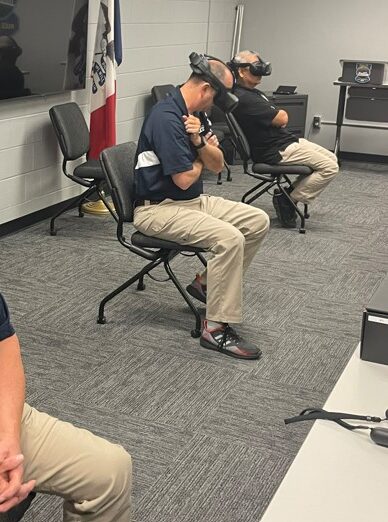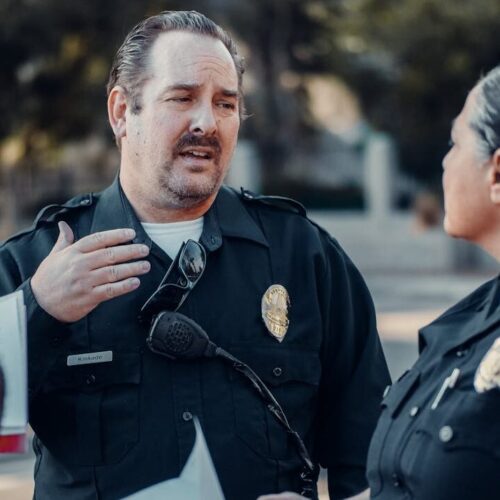
Empathetic Policing: Mason City Police Department Launches Virtual Reality Training Program to Help Officers Better Understand Behavioral Health Crises
Virtual reality training has been growing in popularity across the country, with law enforcement agencies of all sizes using computer-generated scenarios to reinforce topics such as de-escalation and tactical training. Recently, the Mason City (IA) Police Department saw an opportunity to go a step further, implementing a training program aimed at increasing empathy among its officers for people in behavioral health crisis. During the virtual reality training, Mason City officers are immersed into simulated scenarios to take on the perspective of the person in crisis so that they can better understand their needs, how it feels to be in crisis, and how they can support them in the moment.

Chief Jeff Brinkley, Mason
City Police Department
With support from the Bureau of Justice Assistance, which is a component of the Department of Justice’s Office of Justice Programs, through a Justice and Mental Health Collaboration Program (JMHCP) grant, more than 35 officers have taken the training so far. This includes all current sworn officers but not all authorized sworn officers as of yet. Mason City extended this training opportunity to their mental health stakeholders before the end of 2023, further expanding the capabilities of the program. To learn more about this effort, The Council of State Governments (CSG) Justice Center talked to Chief of Police Jeff Brinkley about the experiential training model he has helped to establish in Mason City.
Editor’s note: Answers have been edited for length and clarity.
Mason City has been running this virtual reality training program since October 2023. What led you to the idea, and what were some of the first steps the city took to implement it?
We were looking to find innovative ways to provide exposure to mental health-related conditions for our personnel and saw that Axon was rolling out a virtual reality solution that looked like it had potential. We had previously used scenario-based learning for training in policing, and it always seemed to be the best alternative to “real-life” experience. The intriguing part to me, as we started to look at virtual reality, was the ability to still have decision points built into the scenario. They aren’t live, physical decisions, but mental thought processes that are just as important. I felt like this would help reinforce what we were trying to do as we helped our people think their way through work as well.
Once we received the JMHCP grant award, we were able to field test one of the first units and decided to move forward with it. We then purchased four units that we can use for in-service training and for community outreach. The feedback has been very positive in terms of providing new perspective to both groups.
There are a lot of virtual reality training programs now, but not many that involve officers taking the perspective of a person in crisis. Why was that aspect important for you to include?
Unless you’ve spent time working in this field or living with a family member who struggles with mental illness or other behavioral health needs, it can be hard to understand that perspective. The autism simulation was what really caught my attention originally. I found that being in the shoes of the person with the disability or who was in need was really useful, and the virtual reality technology really helps to bring to life the experience. In order for our officers to respond empathetically, I felt they had to have their own experience with the condition. To me, this is similar to some of the stress inoculation we do with pepper spray and Tasers; it helps for you to know exactly how that feels before you decide to use it on someone else.
Who is required to participate in the program? Are these officers also required to attend a Crisis Intervention Team (CIT) and Integrating Communication, Assessment, and Tactics (ICAT) training first, or is this incorporated into the larger training program?
We put our entire sworn staff through this program when we rolled out the ICAT training at the Mason City Police Department. Our officers get a lot of repetitions in dealing with mental health clients, so we wanted to make sure everyone participated. Many of our new officers have had exposure to CIT training as part of their academy training. But even for those who have not, we used it to reinforce the idea behind ICAT that we should continually be information gatherers and evaluators of our current situation while we are involved in a call for service. I don’t think every officer can do CIT, but every officer can build empathy toward people who have mental illnesses and can skill build for the best outcomes using ICAT.
How are officers responding to the training?
The feedback that we received from our officers was very positive. Since it was a new training experience using the latest technology, that certainly didn’t hurt. I also think it was helpful for them to see someone engaged in active bystander intervention or peer support to give them some ideas about how they could also intervene with a co-worker or friend.
What challenges, if any, have you faced in implementing the training program? What’s also been the most rewarding aspect of it?
I think adapting to new technology is always a challenge for us. This was a new platform that most had never used in their personal life. Technology can also be glitchy, and you must make sure the units are charged ahead of time. The positive has been that the use of the virtual reality technology was intuitive, so there wasn’t a huge learning curve. Several officers commented positively about the vignettes that helped them to see an incident from several different perspectives.
What would you say to another police department considering this training?
I would highly encourage looking at virtual reality as a training tool. This is our first outing with it, and it has been successful. I know I plan to continue looking at virtual reality platforms that reinforce good decision-making and provoke thoughtfulness in our officer’s minds as they complete the training. I feel like the price is reasonable for what you are hoping to gain.
For more information on how federal grants can support your jurisdiction and to learn more about police-mental health collaborations occurring across the country, visit jmhcp.org.
Credits: Photos provided courtesy of Chief Brinkley, Mason City Police Department
About the author

The sharp rise in school shootings over the past 25 years has led school officials across the U.S.…
Read MoreA three-digit crisis line, 988, launched two years ago to supplement—not necessarily replace—911. Calling 988 simplifies access to…
Read More Taking the HEAT Out of Campus Crises: A Proactive Approach to College Safety
Taking the HEAT Out of Campus Crises: A Proactive Approach to College Safety
The sharp rise in school shootings over the past 25 years has…
Read More From 911 to 988: Salt Lake City’s Innovative Dispatch Diversion Program Gives More Crisis Options
From 911 to 988: Salt Lake City’s Innovative Dispatch Diversion Program Gives More Crisis Options
A three-digit crisis line, 988, launched two years ago to supplement—not necessarily…
Read More Matching Care to Need: 5 Facts on How to Improve Behavioral Health Crisis Response
Matching Care to Need: 5 Facts on How to Improve Behavioral Health Crisis Response
It would hardly be controversial to expect an ambulance to arrive if…
Read More












